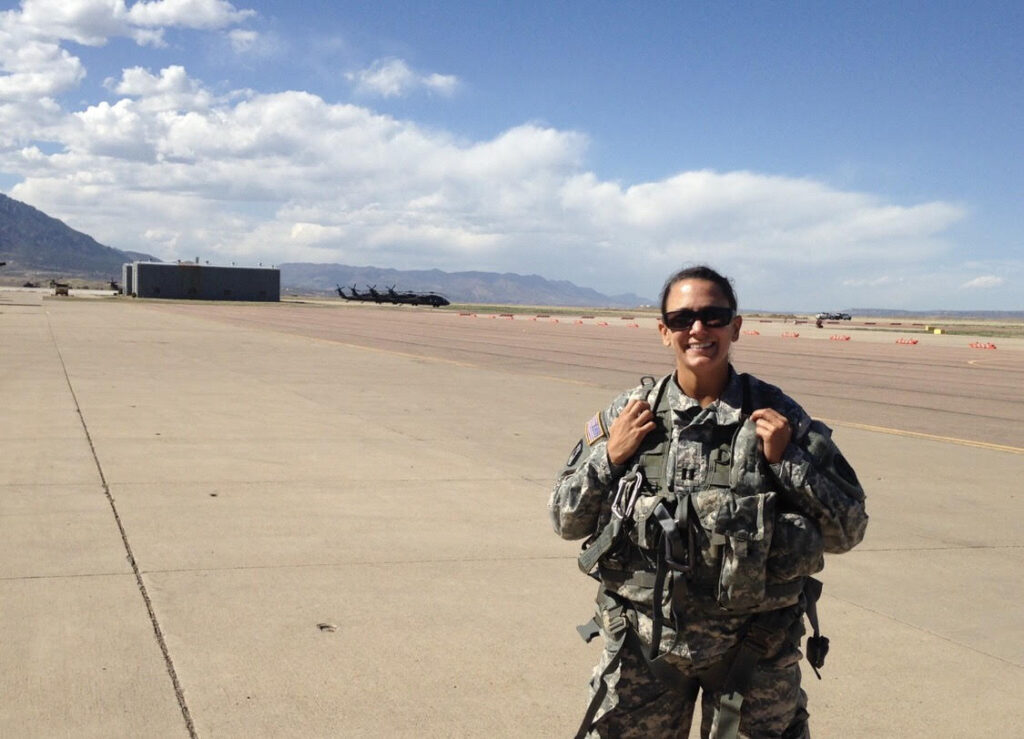Jess Johnson said that one of her proudest moments serving others came on Operation Mold Bay in Baltimore. “The difference between Team Rubicon and other organizations or community volunteering is the importance that TR puts on human connection.
”Johnson said that after the first woman’s house the team mucked out after a flood, Holly, the homeowner, thanked them. Holly told Johnson that was she impressed that people knew her name, wanted to hear her story and treated her as a person. “I was struck that someone could come ‘help’ a person after a tragedy and not take the time to acknowledge or validate what that person was going through,” Johnson said.
“We were told by the Incident Commander in Baltimore to make time for the people, and as a social worker, the human connection piece was very important to me. I want to be with an organization and with volunteers who really care about the people they are helping,” Johnson said.
Johnson spent her first career as the Mental Health Coordinator of Frederick County, Maryland’s criminal justice system, where she said she saw “too many veterans end up.” At the age of 32, Johnson had what she called an “early midlife crisis” on a “random Tuesday night” and ended up joining the army, just like her mom who was an army nurse for seven years and her dad who spent his career in the medical supply corps and retired as a colonel.
“It wasn’t that my life was boring, but that I could see exactly where I would be five, ten, fifteen years down the road and I wanted more. I saw the military as something to be part of that would be bigger than myself, and realized I was searching for the type of community that I had grown up in as an Army brat,” Johnson said.

She remembered a naval social worker speaking to her class when she was an undergrad student so she researched and found there was a need for active duty social workers. She was excited that she would be taken out of her comfort zone. Johnson’s parents had raised their children in a household where giving to others and service was a way of life. “When we lived in Germany, we participated in a toy drive for refugees,” Johnson said. “And at one point, my parents told us to pick out something we were attached to and to give it away to a needy family. We were taught that we had so much so we should give back.”
This may have subconsciously led Johnson into a career and life of full-time service to others. She went with her mother to Baton Rouge after Hurricane Katrina and helped her mom set up a foot care clinic and a diabetes clinic, and did crisis intervention counseling. She also went with a team into New Orleans and stayed in a mosque and worked in a pharmacy before NOLA opened again. Volunteering after Katrina was Johnson’s first experience in disaster crisis response.
In the army, Johnson was a Behavioral Health Officer, though she stated, “We were taught I am a soldier first and a clinical social worker second.” She had hoped that the military would do more humanitarian work, but found it did not. “I thought I would be doing more Peace Corps type shit! I did, however, participate in an emergency management simulation with the Hawaii National Guard, acting as OIC (Officer in Charge) of the FIC (Family Information Center), which furthered my interest specifically in disaster response,” she said. She served for five years and met the soldier who became her husband after her deployment to Afghanistan.
After serving her contract and missing the military and being part of a team, Johnson participated in a variety of volunteer projects, and eventually read an article about Team Rubicon and loved that TR isn’t “waiting for disasters to occur” and is “helping people who need a voice,” Johnson said. “TR attracts the best of the military. I’m passionate about being with others, helping people and getting shit done.” So Johnson participated in Operation Mold Bay in and then traveled to East Cleveland for Operation Ray Chapman, an urban blight clean-up project.

In East Cleveland, the team filled nine 40-yard Dumpsters with debris and cleared another 700 yards of overgrowth. During one vigorous sawing session, Johnson smashed her Apple Watch’s face against a tree and it shattered. The watch was a Christmas gift from her parents. After returning home to Maryland and visiting the Apple store, Johnson said she got Apple Care for her replacement watch, joking that it covers two more TR op-destroyed watches during the next year. But then she added, way more seriously, that breaking a watch was not a big deal compared to the devastation of crime and the neglected state of the neighborhood she had been helping.
Johnson said devoting her life to serving others wasn’t a conscious choice, and she admits to feeling a bit of judgment from others when they find out she’s been focused on volunteering in the last year as opposed to focused on building her next career. “I’m lucky enough to be able to do this,” she said, “but sometimes I feel guilty. I am starting a life coaching business, but Team Rubicon will never be on the back burner because of the way it makes me feel.”
Currently, Johnson is Deputy Wellness Coordinator for TR Maryland. She has put in for a couple of Harvey waves for which she’s awaiting a response, and she’s filling out the TR international application, though she knows there’s a long wait. She’s willing to go wherever TR needs her and wherever people need her, for her clinical social work skills or as extra hands to do grunt work as part of the team.



